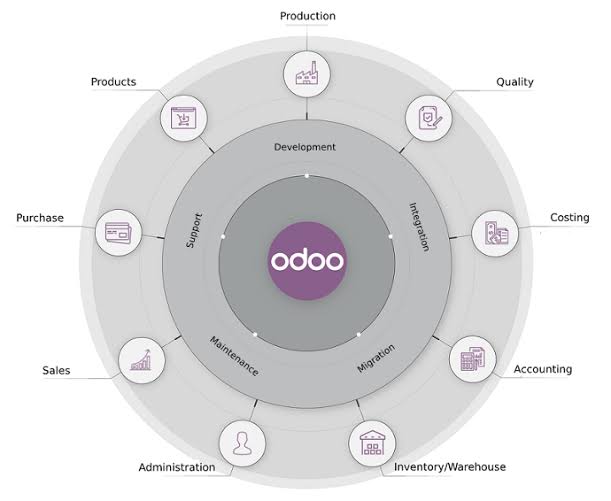Implementing an Odoo ERP system can be a pivotal step for businesses aiming to streamline operations and enhance efficiency. This comprehensive guide will outline the essential steps and best practices to ensure a successful Odoo ERP deployment. With companies facing increasing competition and evolving market dynamics, leveraging the capabilities of an integrated ERP system like Odoo can provide a significant competitive advantage.
By following the guidelines outlined in this guide, businesses can confidently navigate the complexities of Odoo ERP implementation, paving the way for enhanced productivity, improved decision-making, and sustainable growth.
Understanding Your Business Needs:
Before embarking on an Odoo ERP implementation journey, it is essential to understand your business needs and objectives thoroughly. A thorough evaluation of existing systems and procedures aids in pinpointing areas where Odoo can offer significant benefits. This preliminary stage establishes the groundwork for a prosperous implementation, guaranteeing harmony between the ERP system and your company’s strategic objectives.
Selecting the Right Modules:
Odoo offers various modules covering business functions such as finance, HR, inventory management, and sales. Choosing the suitable modules tailored to your specific requirements is crucial for a successful implementation. Careful consideration of each module’s features and functionalities in your business processes ensures that you maximise the benefits of Odoo ERP while minimising unnecessary complexity.
Customisation for Precision:
One of Odoo ERP’s strengths is its flexibility and ability to be customised to fit unique business workflows. Customisation options allow you to fine-tune the system according to your organisation’s processes, ensuring precision and efficiency. By customising Odoo to align with your business requirements, you can optimise workflows, improve user adoption, and drive more excellent value from the ERP system.
Training and Knowledge Transfer:
Comprehensive training is vital to ensure that your team possesses the necessary skills to fully exploit the Odoo ERP system’s capabilities. Provide extensive training sessions to familiarise users with the functionalities and workflows, facilitating a smooth transition. Providing users with fundamental skills and knowledge cultivates a culture of continuous learning and progression and enhances productivity within your organisation.
Testing for Seamless Integration:
Thorough testing is imperative to guarantee the seamless integration of all modules and functionalities of the Odoo ERP system with your business processes. Conduct comprehensive testing to detect and resolve any issues before launch. By simulating real-world scenarios and user interactions, you can validate the system’s functionality, performance, and reliability, thereby minimising the risk of post-implementation issues.
Continuous Support and Maintenance:
After the initial implementation phase, continuous support and maintenance are vital to maintaining the seamless operation of the Odoo ERP system. Establish a support framework to address any issues or concerns promptly. Regular updates, patches, and enhancements are essential to keeping the ERP system up-to-date and aligned with evolving business needs and industry trends.
Monitoring and Evaluation:
Regular monitoring and evaluation of the Odoo ERP system’s performance are essential to identifying areas for improvement and optimisation. Collect input from users and stakeholders to improve processes and consistently boost efficiency. By examining key performance indicators and metrics, you can monitor the ERP system’s impact on your organisation’s operations, enabling informed decisions to promote ongoing enhancement.
Adapting to Change:
As your business evolves, so too should your Odoo ERP system. Stay informed about updates and enhancements to Odoo and be prepared to adapt the system to accommodate changing business needs and requirements. Embrace a mindset of adaptability and innovation, harnessing Odoo’s flexibility to swiftly respond to market changes, seize opportunities, and sustain a competitive advantage.
Odoo ERP implementation involves critical steps and best practices to maximise efficiency and achieve business objectives. By understanding your business needs, selecting the suitable modules, customising for precision, providing practical training, migrating data with care, testing for seamless integration, offering continuous support and maintenance, monitoring and evaluating performance, and adapting to change, you can ensure a successful implementation that drives growth and success for your organisation.



